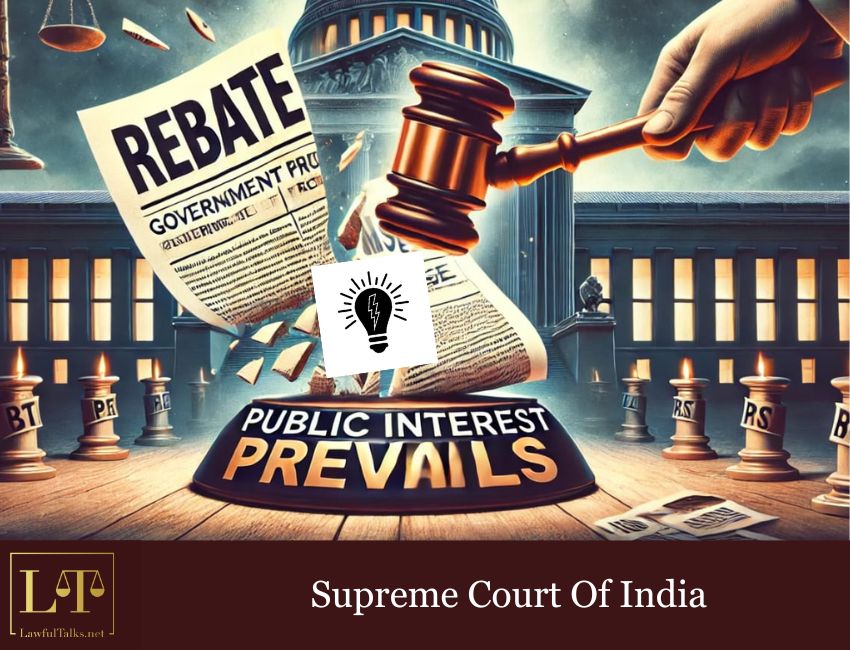Allahabad HC Sets Aside Afzal Ansari's Conviction, Allows Him to Continue as MP

In a significant ruling, the Supreme Court upheld the Goa Government’s decision to reclaim electricity tariff rebates previously granted to various industrial establishments. The Court’s verdict reaffirmed the government’s authority to retract or alter economic incentives if they impose a strain on public finances. A bench comprising Justice Dipankar Datta and Justice Sandeep Mehta concluded that promissory estoppel cannot be enforced in a rigid manner, particularly when state-promised benefits conflict with broader public interest.

The dispute centered around a 1991 notification issued by the Goa Government, which extended a 25% rebate on electricity tariffs to industrial units. However, this incentive was later withdrawn on March 31, 1995. Companies that had applied for power before the cut-off date but began receiving supply afterward argued that they were still entitled to the rebate. The government’s move to rescind the benefit sparked legal resistance from affected industrial entities.
Further complicating the scenario, in 1996, two amending notifications seemed to extend the rebate benefits, leading industries to demand continued relief based on these amendments. However, in 2001, the Bombay High Court declared these amendments void ab initio. The Supreme Court later upheld this decision, reinforcing the government’s position that such incentives could be lawfully withdrawn.
To solidify its stance, the Goa Government enacted the Goa (Prohibition of Further Payments and Recovery of Rebate Benefits) Act, 2002, which mandated the recovery of rebates wrongly granted under the now-invalidated 1996 amendments. The affected companies, having lost before the Bombay High Court’s Goa Bench, escalated the matter to the Supreme Court.
Authored by Justice Datta, the Supreme Court’s ruling relied heavily on its earlier decision in Goa Glass Fibre Limited v. State of Goa & Anr. (2010) 6 SCC 499, wherein the Court had upheld the constitutional validity of the 2002 Act. The judgment further dismissed the appellants’ claim that the Goa Government was bound by promissory estoppel to continue providing the rebate. Instead, it emphasized that public interest takes precedence over private economic benefits, thereby limiting the scope of promissory estoppel in such cases.
The Court further observed, "we have no doubt in our minds that the High Court was right in holding that the appellant-companies before it is not entitled to the rebate and the impugned demand notices do not suffer from any vice including that of illegality."
In support of its reasoning, the Court also cited Pawan Alloys & Casting (P) Ltd. v. UP SEB (1997) 7 SCC 251, where a similar argument was rejected. In that case, the Supreme Court upheld the Uttar Pradesh State Electricity Board’s decision to withdraw incentives before the expiry of the rebate period, reinforcing that promissory estoppel cannot be invoked to sustain benefits that burden the public exchequer.
Ultimately, the Supreme Court dismissed the appeal, affirming the government’s right to regulate economic policies in alignment with public interest. The ruling underscores that while businesses may expect consistency in governmental policies, such expectations cannot override the imperative of safeguarding public finances. The decision serves as a crucial precedent, reinforcing that government commitments to economic incentives are subject to revision if they conflict with fiscal prudence and broader state interests.
Case Title: Puja Ferro Alloys P Ltd. VS. State Of Goa And Ors. Civil Appeal Nos. 2027-2028 OF 2012
For Appellants: Mr. A. Raghunath, AOR, Mr. Santosh Paul, Sr. Adv. Mr. Sriharsh Nahush Bundela and Ors.
For Respondents: Ms. A. Subhashini, AOR, Mr. Abhay Anil Anturkar, Dhruv Tank, Aniruddha Awalgaonkar, Sarthak Mehrotra and Ors.





























































































































































































































































































































































































































































































































































































































































































































































